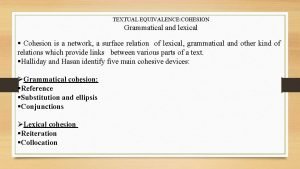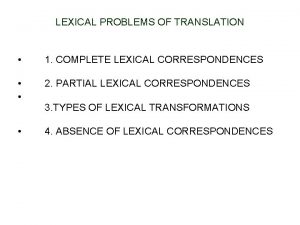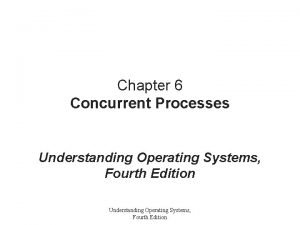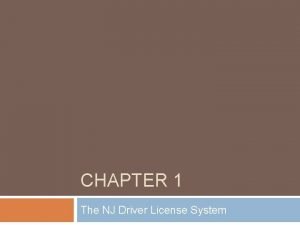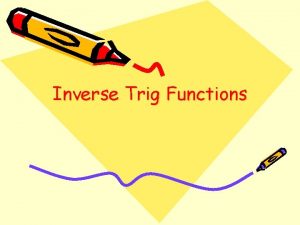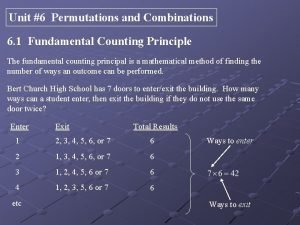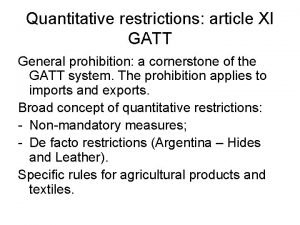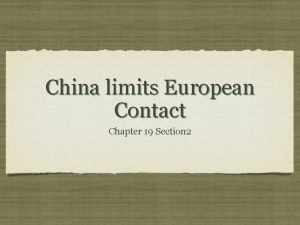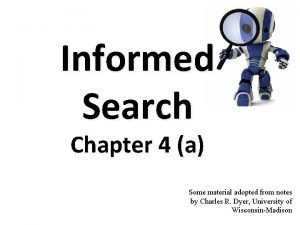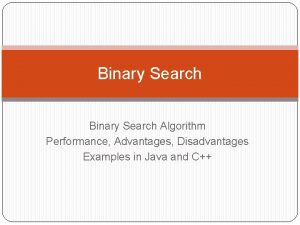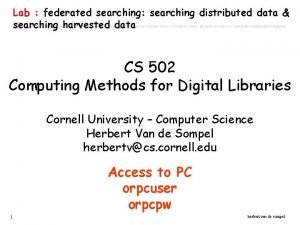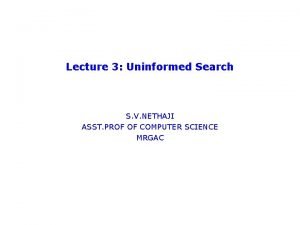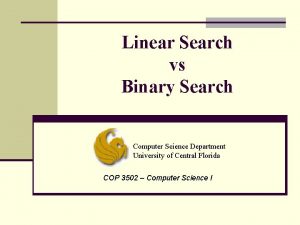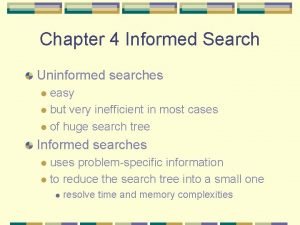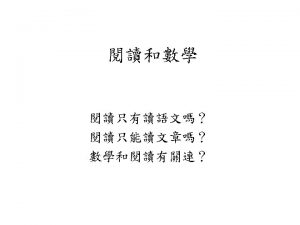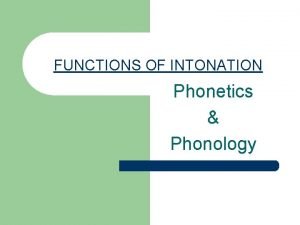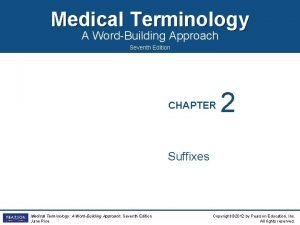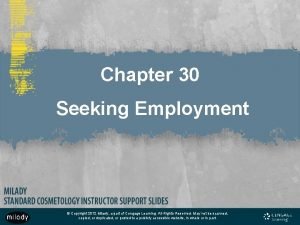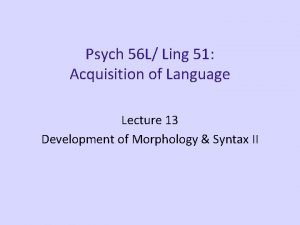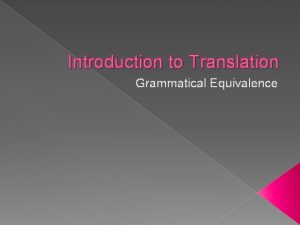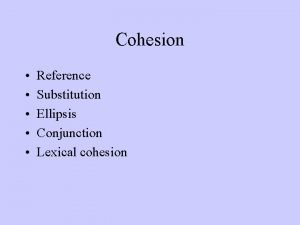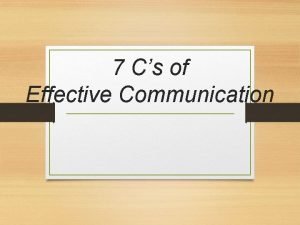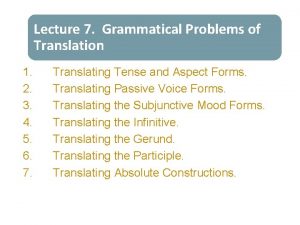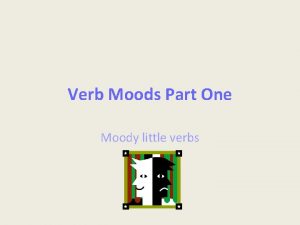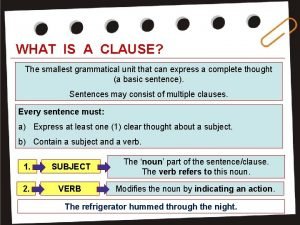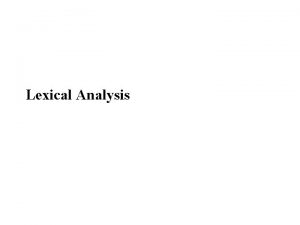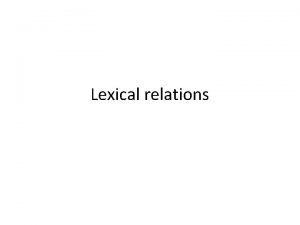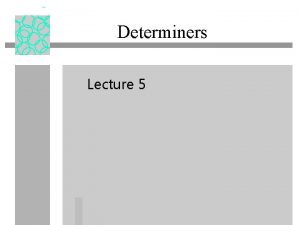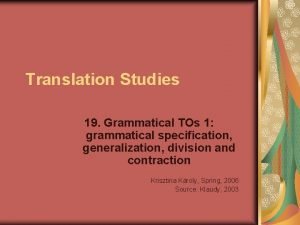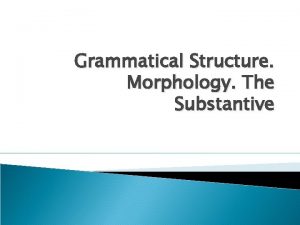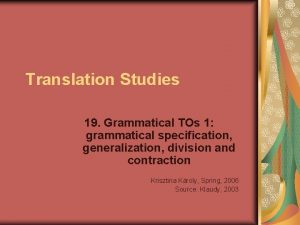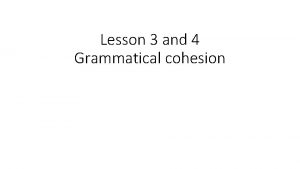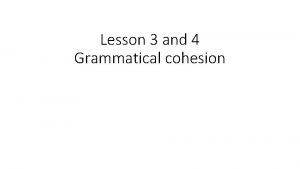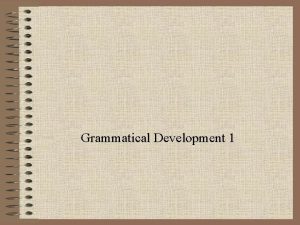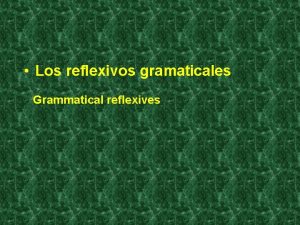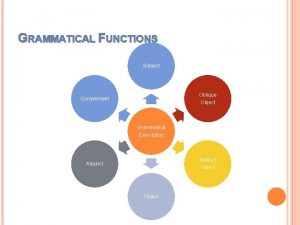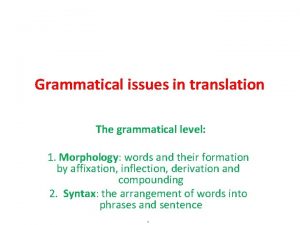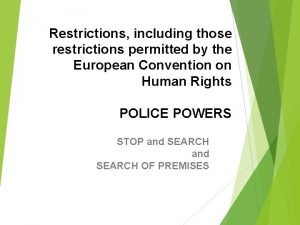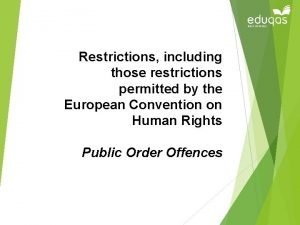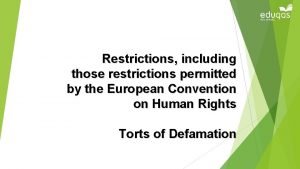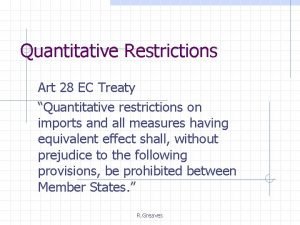Lexical restrictions on grammatical processes in search of











































- Slides: 43

Lexical restrictions on grammatical processes: in search of explanation

Course outline • Lexicon and grammar • Grammatical phenomena under analysis • Lability: a grammatical phenomenon with grammatical and lexical distribution • Complement clauses: grammaticalization of patterns and lexical restriction • Passives: lexical or grammatical restrictions? Morphology is also relevant • Types of explanations

Lexicon and grammar • In the ideal world: - Lexicon includes lexemes and (perhaps) some non-inflectional nonproductive processes. - Grammar (especially inflection) includes productive processes. - If a productive inflectional mechanism are impossible with some lexemes, this should result from their semantics: in some languages, deontic possibility marking is related to agentivity – and / or from their structural properties, which are directly related to the mechanism: in many languages, passivisation is impossible with verbs that have only one.

Lexicon and grammar • However, in many cases, grammatical phenomena are restricted by some groups of language units AND • These restrictions do not follow naturally from the semantics of these grammatical markers, constructions, etc.

Lability

Labile verbs • Verbs that can be either transitive or intransitive • Outline: - Distribution of labile verbs: lexicon vs. grammar - Spontaneity vs.

Labile verbs: spontaneity account • Nedjalkov 1969, Haspelmath 1993: the distribution of causative vs. anticausative type is regulated by spontaneity: Spontaneous (tend to occur by themselves) Non-spontaneous (tend to be caused) freeze-dry-melt-burn-fill-rock-gather-open-break-spill - Anticausative for naturally non-spontaneous situations (the spontaneous situation is marked) - Causative for naturally spontaneous situations (the non-spontaneous situation is marked) • What about lability?

Labile verbs: spontaneity account • The difference between the spontaneous vs. non-spontaneous parts of the scale is much less significant than with anticausaitve and causative types. • Often useful: in Adyghe, the non-spontaneous part is labile; in French, the spontaneous part • In many languages of Haspelmath’s sample, the ‘labile’ part is not continuous. German: freeze-dry-melt-burn-fill-rock-gather-open-break-spill Lezgian (Haspelmath 1993 a, 1993 b): freeze-dry-melt-burn-fill-rock-gather-open-break-spill • Other parameters?

Labile verb: lexical parameters (semantic class) • Number of labile verbs in different semantic groups: Class Phasal Average numer of labile verbs 6 (2 situations, 12 labiles) Destruction 3, 09 (11 situations, 34 labiles) Non-physical affect 2, 33 (3 situations, 7 labiles) Motion 1, 91 (11 situations, 21 labiles) Verbs with animate patient 1, 67 (3 situations, 5 labiles) • ! The difference is more significant than if we use spontaneity.

Lexical restriction? Yes and no. • Yes, labile verbs are more closely related to lexical properties than causativization and anticausativization. • Yet, there are languages ‘more grammatical’ and ‘more lexical’ lability • Lexical: German and, especially, Lezgian • Grammatical: Adyghe, English (lability of the whole scale or a continuous part of the scale AND: Lability is related to grammatical markers in that labile verbs sometimes exclude causativization or anticausativization.

Lexical restriction? Yes • Adyghe: q wəten ‘break; cause something to break’ ʁe-q wəten [CAUS-break] ‘cause someone to break something; *cause something to break’ The lexical phenomenon (lability) is a reason for the restriction on the grammatical phenomenon (causativization)? Or there is an independent restriction on causativization (e. g. , NO DESTRUCTION VERBS).

Complementation

Arguments of nominalizations: lexical restriction or different grammar? • Grimshaw (1990), Knjazev (2014) point out that not all nominalizations retain argument clauses. • Knjazev: the role of definiteness and thematicity (rhematic and indefinite nominalizations easier host argument clauses). • Russian: vazhnost’ ‘importance’ vozmozhnost‘ ‘possibility’

Vazhnost’ and vozmozhnost’ • Looks as a purely lexical context: *On znal o vazhnosti eto sdelat’. Intended: ‘He knew of importance to do it. ’ On znal o vozmozhnosti poexat’ v Angliju. ‘He knew of the possibility to go to England’. Semantic parameters? E. g. modal semantics (vozmozhnost’) vs. evaluation (vazhnost’)?

Back to grammar • Vozmozhnost’ can be: - A property (the fact that something is possible) - An abstract entity (the chance, the possibility which is open) • Vazhnost’ can only be a property.

PL The Russian situation is not unique DEF Romanian, French: ‘importance’ also retains arguments worse than thing. PL ‘possibility’ and / or ‘necessity’. Romanian: Toti intelegeau necesitate-a discuta astazi all understand. PST necessity. DEF discuss today ‘Everyone understood the necessity to discuss everything today. ’ *Toti intelegeau importanța de-a discuta astazi all understand. PST importance. DEF discuss today ‘Everyone understood the importance to discuss everything today. ’ totul. all. DEF totul. all. ‘I understand the importance to disc (6) *Je comprends l'étrangeté de d DEF

Further about complement clauses: the role of frequency? • Predicatives vs. verbs • Unreal vs. real clauses (see Dobrushina 2012, 2016)

Complement clauses: infinitives • Meshat’ vs. nravit’sja • Only nravit’sja allows infinitive: Mne nravit’sja by-t’ zametn-ym. ‘I like being noticeable / visible. ’ *Mne mesha-et by-t’ bol’n-ym. Mne mesha-et chto ja bolen. ‘It bothers me that I am seek / *to be seek. ’

Purely lexical? • It might seem that the restriction is lexical (in fact both meshat’ and nravit’sja are possible in co-reference situations, but only one of them allows infinitives). • However, there are two grammatical restrictions / tendencies.

Subject restriction • Infinitives in Russian are restrictedly possible in subject position. - Impossible in the subject position of transitive verbs: serdit’, zlit’. - Restrictedly possible in the subject position of intransitive verbs.

Grammaticalization and frequency • Infinitive is ‘most grammaticalized’ among all means of complementation. • The argument clause is the least autonomous when it is non-finite (no nominative subject, restricted set of adverbial modifiers (see Gerasimova 2015 on structural differences between infinitive constructions).

Another manifestation of the role of frequency • In general, Russian verbs compatible with the marker chtoby in different subject complement clauses, take infinitives in same subject constructions: Ja xochu pe-t’. ‘I want to sing. ’ Ja xochu chtoby ty pel. ‘I want you to sing. ’ However, there are exceptions.


Dobivat’sja and sledit’ • Dobivat’sja: всего — 6749, chtoby — 228, GEN — 3883 • Sledit’: всего — 20749, chtoby — 793, za – 13824 • Xotet’: всего — 418580, chtoby — 9417, GEN — 26792 • Trebovat’: всего — 58423, chtoby — 3817, GEN — 27285

Other restrictions on argument clauses: negation • The complementizer chto: the most productive and frequent of all Russian complementizers. • Compatible with both factive and non-factive verbs. Ja dumaju, chto on umer. ‘I think that he died. ’ Ja znaju, chto on umer. ‘I know that he died. ’

Negation: restrictions on something very productive • Some lexical? restrictions: oprovergat‘ otricat‘ ‘negate’ somnevat‘sja ‘doubt’ NB: ‘negative verbs’ (verbs that presuppose or imply that the embedded predication is false).

Negation: restrictions on something very productive • Not lexical restriction: rather a grammatical restriction that reveals the nature of chto: chto prefers contexts where the polarity of the main clause agrees with the polarity of the embedded clause. • Change of the polarity (addition of ne) turns the verb to the class of ‘positive’ verbs. • The restriction is useful for understanding of grammatical semantics of the marker.

Negation

Similar restrictions with chtoby Petja soglasilsja chtoby jemu pozvonili. ‘Petja agreed that someone call him. ’ ? ? Petja otkazalsja chtoby jemu pozvonili. Intended: ‘Petja refused that someone call him. ’

Syntactic doubling in Russian • Cases when the form of the embedded verb repeats the form of the main verb. • Only with several lexemes: nachat’ ‘begin’, zanjat’sja ‘occupy oneself with’, dojti do ‘reach, go as far…’ • Lexical restrictions



Inside doubling: another grammatical difference … ne ogranichivat’sja tem chto vsex rugat’ ‘… not to restrict oneself with scolding everyone…’ *Ne ogranichivajsja tem chto vsex rugaj! ‘Do not to restrict oneself with scolding everyone!’

Syntactic doubling • Implicative verbs (Karttunen 1977). • The main situation takes place iff the embedded one takes place. • BUT why verbs like zastavit’ ‘make’ or udat’sja ‘manage’ show no doubling? • Implicative verbs with high degree of contiguity of the two situations. • Only those verbs which modify the embedded verb (= denote a phase or an evaluation of the embedded verb).

Russian passivization: the role of morphology • Two ‘passive forms’ in Russian: • stroil-sja ‘was being built’ (IPFV) • by-l postro-en ‘was built’ (PFV) The combination of byt’ + participle is referred to as passive. The –sja-form is either referred to as passive or as middle (= the passive reading of form expressing generally transitivity and valency increase).

Some restrictions on sja- passive Those verbs do not have a sja-passive or it is highly infrequent: • Katit’sja (‘roll’, only anticausative) • Smotret’sja (‘look’, potential / modal reading like ‘look like’) • Meshat’sja (‘mix’, no passive reading) A lexical restriction?

Concurrence of grammar vs. lexicon • Prefixed verbs with the same roots form passives: Vykatyvat’sja ‘roll out (spontaneously; be rolled out) Prosmatrivat’sja ‘be visible; be watched (of a film)’ Razmeshivat’sja ‘be mixed’ • Not purely lexical restriction. • Rather, with non-prefixed verbs, anticausative and other semanticchanging operations prevail over passivization. • This is not the case with passive.

Concurrence of grammar vs. lexicon • Non-prefixed verbs: dictionary units • Sja-verbs keeped in the lexicon as single units (smotret’sja ‘look like’) • Prefixed verbs: derived, not purely dictionary units • The meaning of –sja is also derived • Various meanings are possible to construct (not restricted by the lexicon, built when it is necessary)

‘Lexical’ restrictions as a path to a more fine-grained description • ėto-pronominalization (reference to situations expressed by clauses): - Petja uexal. – Ja eto znaju. ‘Petja left. – I know it. ’ In the context of ‘also’ only some verbs are possible. - Ja znaju chto Petja uexal. – Ja tozhe ėto znaju. ‘I know that Petja left. – I know it too. ’ - Ja reshil uexat’. - *Ja tozhe ėto reshil. Intended: ‘I decided to leave. – I decided to do it too. ’

‘Lexical’ restrictions as a path to a more fine-grained description • In reality, ėto behaves differently when the antecedent clause is a complement clause or independent clauses: Petja uezzhaet. On ėto davno reshil. ‘Petja is leaving. He has decided it for a long time. ’ ? Petja reshil uexat’. On ėto davno reshil. ‘Petja decided to leave. He decided it for a long time. ’ A lexical restriction (with reshit’, ėto is less free than with znat’) + a restriction between two types of uses.

Conclusions • Some uses of -sja are rather ‘derivative’, others (passive) rather inflectional (no equivalence between all uses). • Lexical restrictions can result from the concurrence of grammatical (inflectional) and derivative devices. • See above on the concurrence of lability vs. derivational markers.

General conclusions • The phenomenon under analysis, virtually single, in fact include many small ‘parts’ (sub-systems). • These parts often seem to be arbitrary (lexical). • In reality, though, they are often grammar-dependent. • This subdivision shows that the grammatical phenomenon itself (lability, complementation) is more complicated than it was claimed in the beginning.

General conclusions • From ‘typology of categories (and their expression)’ to ‘typology of domains’: - Domains which often show productive mechanisms, not restricted lexically / semantically - Domains which show non-productive mechanisms (lexically motivated / motivated by more special grammatical restrictions) - Complementation: many non-productive mechanisms: the properties of the main verb tightly correlate with the properties of the embedded one.
 Grammatical meaning and lexical meaning
Grammatical meaning and lexical meaning Grammar features examples
Grammar features examples Example of textual equivalence
Example of textual equivalence Lexical problems of translation and lexical transformations
Lexical problems of translation and lexical transformations Concurrent in os
Concurrent in os Public ignores prohibition restrictions
Public ignores prohibition restrictions Examination permit nj restrictions
Examination permit nj restrictions Inverse trig table
Inverse trig table Section 321 type 86
Section 321 type 86 Unit 6 lesson 1 permutations and combinations
Unit 6 lesson 1 permutations and combinations Article xi of gatt
Article xi of gatt Buddhist dietary restrictions
Buddhist dietary restrictions Chapter 19 section 2 china limits european contacts
Chapter 19 section 2 china limits european contacts Best first search in ai
Best first search in ai What is an advantage of a binary search
What is an advantage of a binary search Federated search vs distributed search
Federated search vs distributed search Which search strategy is called as blind search
Which search strategy is called as blind search Blind search adalah
Blind search adalah Search by image
Search by image Informed and uninformed search in artificial intelligence
Informed and uninformed search in artificial intelligence Yahoo
Yahoo Gravity yahoo
Gravity yahoo Blind search algorithm
Blind search algorithm Image search yahoo
Image search yahoo Mail @ malaysia.images.search.yahoo.com
Mail @ malaysia.images.search.yahoo.com Video search yahoo
Video search yahoo èinterest
èinterest Unified search vs federated search
Unified search vs federated search Multilingual semantical markup
Multilingual semantical markup Grammatical function of intonation
Grammatical function of intonation The suffix in the terms comatose and grandiose means
The suffix in the terms comatose and grandiose means Milady chapter 30 vocabulary
Milady chapter 30 vocabulary Grammatical lead example
Grammatical lead example Signal words tagalog
Signal words tagalog Examples of grammatical competence
Examples of grammatical competence Competence vs performance in linguistics
Competence vs performance in linguistics Disticntion
Disticntion Reference substitution and ellipsis
Reference substitution and ellipsis Effective communication completeness
Effective communication completeness Free word groups examples
Free word groups examples дієприслвник
дієприслвник Imperative sentence definition
Imperative sentence definition Present continuous verb to be
Present continuous verb to be A clause is the smallest which unit
A clause is the smallest which unit


